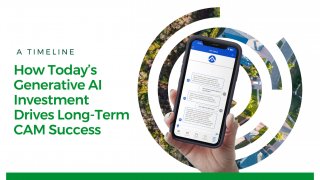- April 27, 2021
- CINC Systems

“I’ll see you in two weeks!” Remember when we said that to our employees on the second Friday of March 2020? We all sincerely believed that we’d spend a couple weeks sprawled on our couch, semi-working while semi-catching up on our favorite reality TV show. It seemed like a nice staycation.
Boy were we wrong. In a matter of weeks we witnessed our fellow neighbors losing their jobs, pulling kids out of school, catching COVID themselves, and worst of all, some of them dying.
Weeks turn into months, and what was once a minor inconvenience soon spiraled into a major catastrophe. And COVID-19 wasn’t the only crisis we experienced in the past year – brutality against people of color forced all of us to closely re-examine the way we treat one another, and massive political division drove tension that one couldn’t even escape through a Zoom-enabled Thanksgiving dinner.
We’re now approaching the second half of 2021, and while this may seem like a whirlwind of a year, there are many reasons to feel hopeful. Almost 30% of the U.S. population is vaccinated. Case counts continue to drop. Schools and small businesses are reopening, and CDC guidelines are relaxing for those of us who are vaccinated.
What does this all mean? Some of us have excitedly purchased our first plane tickets in over a year for a summer trip. Others are still hunkered down in “wait-and-see” mode. None of us have a magic wand where we can capture a glimpse of exactly what the end of 2021 will be like, but we are all trying to rebuild our lives to some sense of normalcy. And when it comes to the way we lead our community associations, we are all asking one another one simple question: What’s next?
We’re not done.
If you’re an avid TikTok scroller, you know the song, “The Pandemic Isn’t Over Just Because You’re Over It.” It’s not just a catchy tune, but it is a matter of fact. We certainly should be planning ahead to drive homeowner engagement and satisfaction, but that doesn’t mean we can throw away all of our masks and pretend there’s no risk. We can move forward, but we can’t do so without looking back.
Associations should carefully review CDC community guidelines, which are regularly updated, to ensure that homeowners and board members are safe when conducting HOA/COA affairs. This means continuing to hold virtual meetings, wearing masks in social gatherings, and practicing social distancing. As the summer approaches, you may also want to consider limited occupancy for pools and recreational areas and enforce online reservations.
As we continue to maneuver through the Pandemic, we know that communication is key in driving homeowner engagement, transparency, and satisfaction. Vaccination protocols vary greatly among states, and many of your residents may be having trouble understanding when and how they can get vaccinated. Offering updates through your website and app and links to book appointments are great ways to help everyone in your community stay informed and safe.
We shouldn’t just go back to the way things were.
Sure, 2020 was a dumpster fire of a year. But we did learn a lot that we shouldn’t throw out the door the minute things start to feel back to normal. Spoiler alert: We don’t always have to be face-to-face to get the job done (and get it done well).
Many of us have realized that HOA/COA board meetings are just as productive, if not more productive, through Zoom versus in person. The same goes for monthly board meetings and many small gatherings. The same is true for our own employees, too. From Fortune 500 to start-ups, many corporations are preparing for a return-to-work scenario that looks significantly different from the past. Some employees may choose to work remote for 100 percent of the time, while others may adopt more of a hybrid approach. This is true within our own industry, too: David Priestley, President of Priestley Management Company, intends to allow his staff to continue remote work for part of the week, as this flexibility has improved employee satisfaction. Thanks to robust cloud-based systems, he’s able to do that with ease.
In the past year, we also learned a lot about virtual tools. While virtual happy hours should probably be abandoned the moment we’re able, virtual webinars and learnings are great ways to break up the day while gaining valuable insight to grow one’s business. There are also many tools in our community association arsenal that have transformed from a nice-to-have to a full-on necessity. From mobile apps to broadcast texting, staying connected via the phone is here to stay.
Diversity isn’t just a fad.
According to the Community Associations Institute, 53% of surveyed community association managers said they are aware of at least one diversity and discrimination complaint among their residents. Diversity, equity and inclusion policies aren’t just trending topics as a result of the rise in hate crimes and social justice initiatives. Proper implementation of policies and training will help better support your homeowners while driving the engagement of your incoming Gen Z employees.
Implementing a pledge to promote equality and non-discrimination, like the one created by CAI, is an important start in driving DEI initiatives within your community. Offering trainings for employees and board members on how to handle reports of discrimination and fair housing policies are also important. Diversity also means celebrating one another’s backgrounds and differences, and this can be done through a myriad of cultural events and communications. For instance, your community could highlight holidays from all religions and cultures in your events calendar. You could even (when it’s safe!) promote “around the world” gatherings to try foods and drinks from different cultures. These inclusive events can be exercised within your own team of employees as well as your HOAs/COAs.
Preparing for the next worst-case-scenario
Let’s go back to the first question posed: What’s next? Now that we are rebuilding our world after one of the biggest crises in our lives, how do we plan for the next big-worst-thing? The biggest lesson many of us have learned from this experience is that through it all, community association management companies need to have a business continuity plan.
Business continuity planning creates a foundation of ongoing support for your business in the event of service disruption. These plans try to account for all manner of disasters, from the predictable to the not-so-predictable.
A proper business continuity plan helps an organization:
- Sustain critical business functions during disasters;
- Develop a before/during/after plan for crises, from a moderate to severe state;
- Keep employees prepared and trained for times when disaster recovery falls in their hands, and;
- Create achievable recovery plans once the crisis is over
If you’re unsure of how to build out your business continuity plan, have no fear. We have a guide just for that – because one of the biggest lessons we learned from 2020 is that we need to be more prepared. To develop your business continuity plan, check out our Emergency Management Guide.
We may not officially know what’s to come, but we do know how to prepare for it to the best of our abilities. And one of the best lessons we’ve learned from this past crisis? We’ve learned just how resilient we are.
Related Reads

Blog
Keeping Calm and Carrying On: Leadership Tips for Turbulent Times
- November 20, 2024

Blog
AI at Bat: What Umpires, Baseball, and Data Security Can Teach Us About AI Risks
- October 28, 2024

Blog
Do I really need a homeowner app when I have a mobile-friendly website?
- October 14, 2024

Blog
Weathering the Storm: How to Adapt to Soaring HOA Insurance Costs
- October 1, 2024

Blog
How Today’s Generative AI Investment Drives Long-Term CAM Success: A Timeline
- September 16, 2024

Blog
A Common Sense Approach to Simplifying Budget Planning Get ready to conquer HOA budget season with this effective strategy
- September 2, 2024
